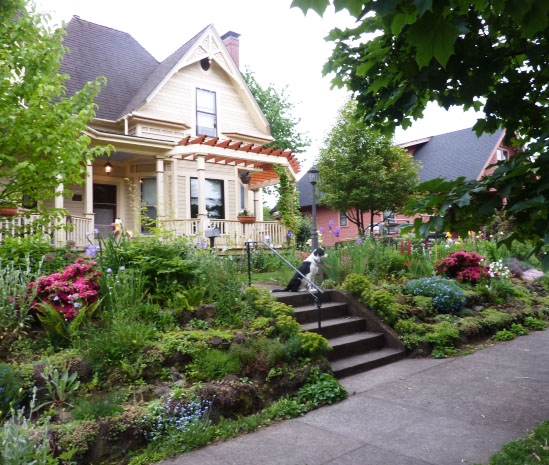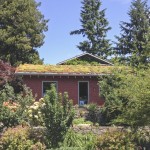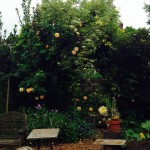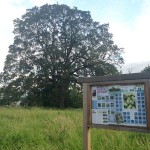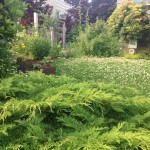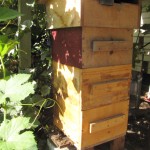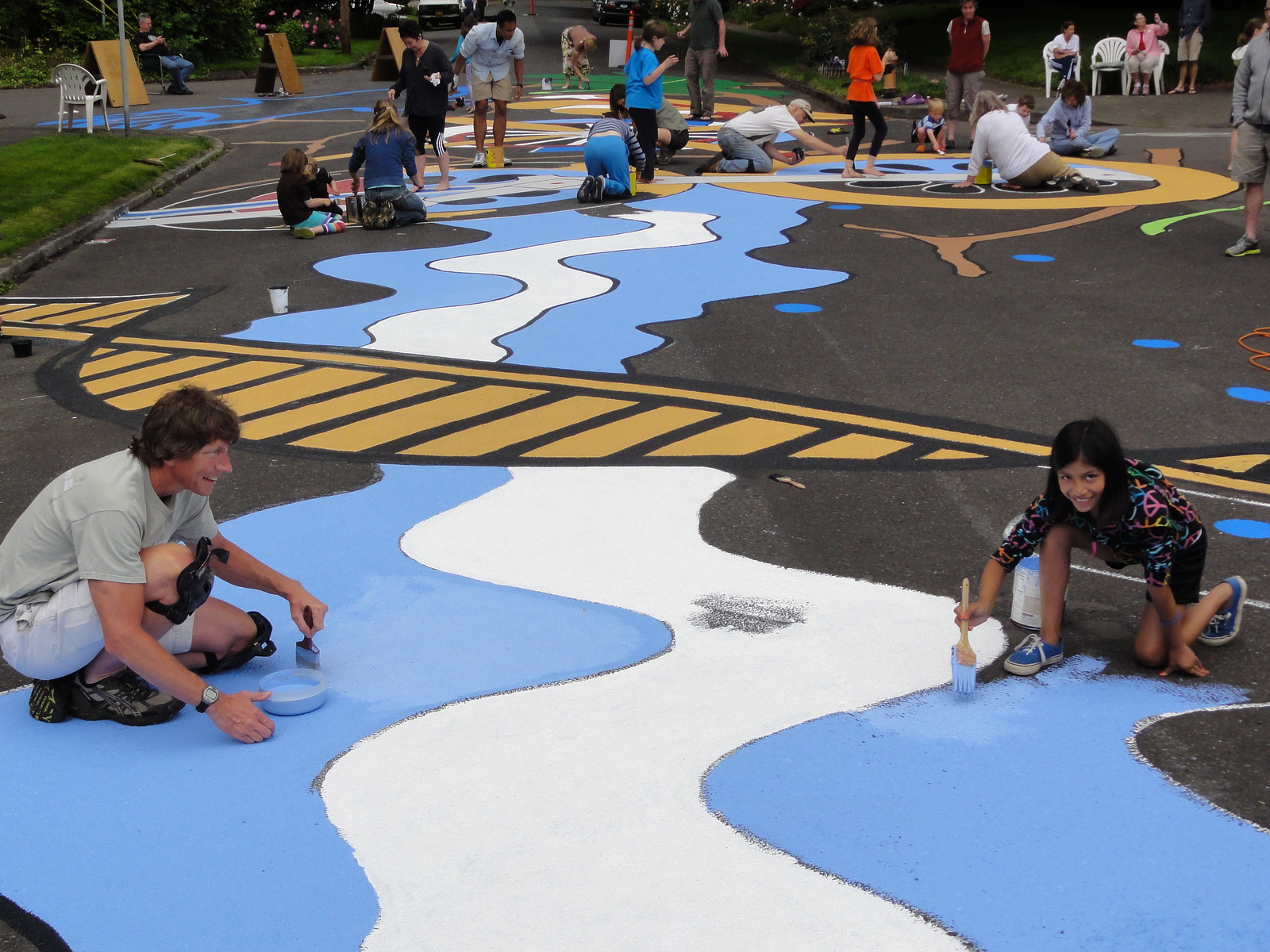This year Sustainable Overlook is showcasing 10 inspiring and unique gardens – all chemical free. We can recommend visiting all of the gardens on the tour, though each one is so captivating you may not have time for all of them! We’ve been getting to know each of the gardeners and are amazed by the loving care that goes into their yards, and how willing they are to take risks, ask for help and in turn to open their garden to help others learn and be inspired.
The theme of this year’s tour is ‘Building community and resilience’ – Sustainable Overlook’s motto. Each garden has elements that express the theme, for instance benches and poetry boxes that invite neighbors to linger and mingle, edible landscaping that produces enough food to feed multiple families, rain storage systems that could provide water in an emergency, eco-lawns and green roofs that provide habitat as well as beauty and a host of other benefits.
The tour benefits the Pesticide Free Overlook project, an effort to make our neighborhood Portland’s first pesticide free community. You’ll have a chance to take the pesticide free pledge when you sign in for the tour, and your donations benefit this effort to make our community safer and healthier for all!
See you on the tour!
– Mulysa, Ann and the Sustainable Overlook team
Learn about the gardens, gardeners, community partners and businesses on the 2014 Sustainable Overlook Garden Tour:
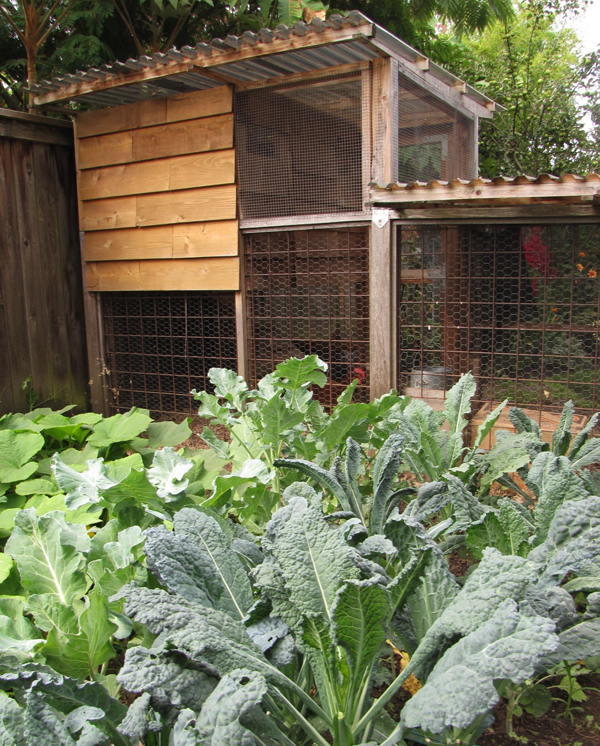
Greens and the Chicken coop at Ann’s garden.
Garden No. 1: 5929 N. Curtis (Sign-in, donate and get your map here or at Garden No. 10.)
Ann and Neal Forsthoefel have turned their corner lot into a year-round organic urban farm, producing veggies, fresh fish in a hydroponic system and eggs. Their ‘friends and family’ CSA produces food for a lot of people! Through creative use of their parking strips for raised bed gardens, they still have room for roses, the dog and space for friends to hang out.
Growing Gardens
Oregon Right to Know – GMO Labeling Campaign
Garden No.2: Jan-Marc Wine Cellars
Jan-Marc Baker’s garden includes a large edible garden on the parking strip, a native habitat garden and his wine making business. The gardens on a busy corner engage passers by and especially curious children and on nice weekends he opens his garage-turned winery for tastings.
The site will soon be a certified backyard habitat due to new native plantings by Leslie Campbell of Habitat Design and Lory Duralia of Bosky Dell Natives who will be on site for the tour. Of the natives, Jan-Bakers says “Our intention is simplicity, in that we can conserve water and labor with low-maintenance gardening. The many pollinators it draws aid the vegetable garden, and the surrounding landscape, including our neighbors.”
Like all the gardens on the tour, this site is an example of how successful organic gardening can be. “We have found that the simple way to go pesticide-free in our garden is to over-plant the vegetables, that is, to put an abundance of them in the ground, giving the insects plenty to satisfy their needs, while still having enough for our enjoyment.”
Jan-Marc Wine Cellars
Leslie Campbell – Habitat Landscape Design
Bosky Dell Natives
Garden No.3: The Historic Elliot House
The Historic W. C. and Adeline Elliott House was built in 1902 and is being lovingly restored by Bob and Sharon Sullivan. For the tour, they will open its doors to allow visitors to view the stunning first floor of this classic Victorian home. Ladies in Victorian costume will be present to interpret the period restoration and gardens.
They have created a front yard garden and rockery attracting honey bees, bumble bees and hummingbirds. The colorful cottage-garden style plantings attract a lot of comments from passers-by and provide an opportunity to talk with neighbors about gardening for pollinators. Sharon explains, “We have not used any pesticides since we acquired the property in 1998. Besides the many species of flowers, we grow tomatoes, and are planning a larger vegetable garden in the back yard after the next phases of the restoration work on the house are finished.”
Garden No.4: Sea and Sage Farms
You can’t miss Deb and CJ’s bright, cheerful orange house with the striking blue and purple spring flower garden. This Backyard Habitat provides flowers for beneficial insects and birds, while edibles in the parking strip create an avenue for interacting with Beach School students who pass by each day. Many neighbor kids know it’s the place to taste early summer strawberries or even to bring home a start. Deb’s drinking vinegar (shrub) business ‘Sea and Sage Farms’ uses locally sourced herbs and fruits, some from the garden here.
Garden No.5: Mike O’Brien
When you pass by Mike O’Brien’s house, you’ll probably notice the living roof covered with cheerful succulents. Then you’ll see terraced vegetable gardens, fruit trees on the parking strip and lots of flowers for bees. Look even closer and you’ll see little solar lanterns on the steps. What you don’t see is that this home and garden have been very thoughtfully designed and built “to be sustainable, to the best of our knowledge, ability and budget.” by a former City of Portland Green Building planner who says “To us, sustainability starts with the community. For example we hired local craftspeople and specified local materials as much as possible. We used many salvage and recycled materials from local suppliers like The Rebuilding Center.”
Garden No.6
Kerri Creager’s 20 year old garden is a mix of edible, native and ornamental plantings including many beautiful plants from her Grandmother’s garden on Chehalem Mountain. Her family and neighbors make good use of a new outdoor dinning room for community dinners that rotate around the block.
East Multnomah Soil and Water Conservation District “We help people care for their land.” Learn about rain gardens, naturescaping and more.
Garden No.7 Nikkie West
Nikkie West is the co-coordinator of the Backyard Habitat Certification Program and her own garden shows her love and knowledge of native plants. The rain garden and hillside beds have a mix of bird and pollinator-friendly native plants and the parking strip has been converted into a low meadow of Willamette Valley natives.
Backyard Habitat Certification Program
Backyard Habitat Certification Program Landscaper Directory
Garden No.8
Sorrel and Chris Arends’ front yard garden has year-round raised beds full of veggies, espallier fruit trees and drought-tolerant herbs. It produces way more food than they can eat and provides a great excuse to talk with neighbors. A pretty eco-lawn will be a nice spot for baby to play. New this year is a mason bee house to help with fruit tree pollination.
Garden No.9 Ruth Oclander and the Oak Meadow
Ruth Oclander’s garden has a mix of native, edible and drought-tolerant plants, a chicken coop and a poetry box along the front side walk. While the garden started off as mostly ornamentals with lawns in the front and back yard, Ruth has been learning about the importance of native plants in providing valuable habitat for our threatened bird and pollinator species and gradually naturescaping the yard while keeping lawn for kids’ games and plenty of fruit and berry bushes and veggies. A newly sheet mulched parking strip will become a meadow planted with Willamette Valley natives to mirror the meadow site undergoing restoration across the street.
Ruth is the founder of Friends of Overlook Bluff, a project to protect and restore oak savannah along its historic range that borders our neighborhood. They are the recent recipients of a Metro Nature in Neighborhoods Grant, a testament to the power of neighbors working together to protect green space, increase habitat and preserve a historic tree. The meadow restoration has included invasive species removal and planting of native oaks, shrubs, flowers and grasses. The site provides habitat for deer, raptors, songbirds and many other species. Check out their great spring plant sale!
Garden No.10: 3908 N. Concord (Sign-in, donate and get your map here or at Garden No.1.)
Leslee Lewis’s garden is an evolving permaculture system that includes fruit trees, berry bushes and cane fruits, chickens, honey bees, rainwater catchment, leaf corral composting, terracing, sheet mulching, reclaimed materials greenhouse. It’s a great place to see a lot of methods in action, plus it’s a backyard habitat.
When Leslee built a wall, she made sure there was a bench at the corner for neighbors to stop. The fantastic street mural and traffic mitagating planter boxes were designed and coordinated by Leslee and a group of neighbors as part of the 2012 Village Building Convergence and has become an annual community event.
Bee Friendly Portland


